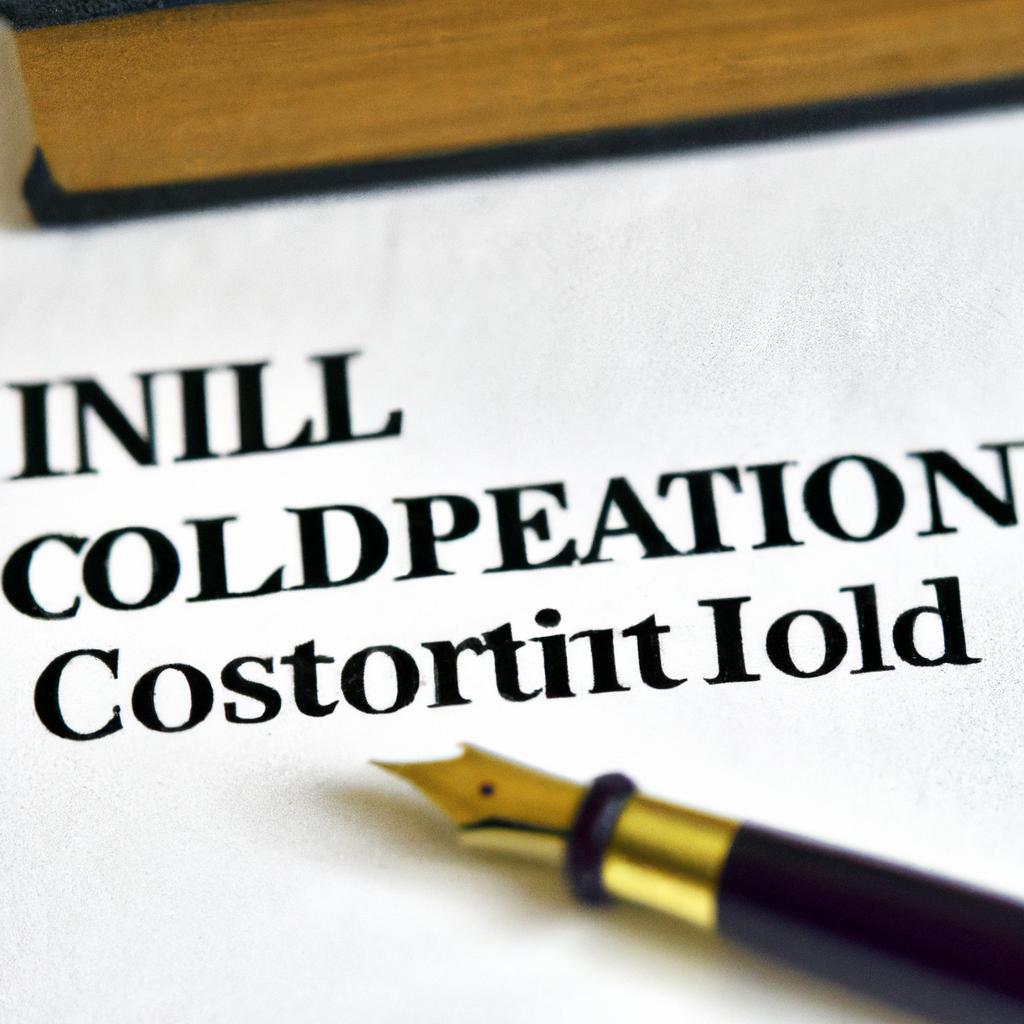In the intricate world of estate planning, the addition of a codicil to a Will can raise questions and concerns about the validity and execution of such amendments. One particular query that often arises is whether a codicil must be notarized to be legally binding. As seasoned practitioners in the field of estate law, Morgan Legal Group in New York City is well-versed in addressing such matters with precision and clarity. In this article, we delve into the nuances of codicils and explore the necessity of notarization in ensuring the integrity of your testamentary intentions. Join us as we navigate the intricate tapestry of legal requirements surrounding the execution of codicils in the realm of estate planning.
Understanding the Purpose of a Codicil in Estate Planning
When it comes to estate planning, a codicil is a legal document used to make amendments to a will. It is essentially an addendum that allows individuals to make changes or additions to their existing will without revoking the entire document. A codicil can be used to update beneficiaries, change executor appointments, or modify any other provisions within the will.
While a codicil does not necessarily have to be notarized to be legally valid, it is highly recommended to do so in order to prevent any potential disputes or challenges to the document’s authenticity. Notarizing a codicil adds an extra layer of security and ensures that the changes made to the will are legally binding. It also provides evidence that the document was signed voluntarily by the testator.

The Legal Requirements for Validating a Codicil
When it comes to validating a codicil, there are specific legal requirements that must be met to ensure its validity. While not every state requires a codicil to be notarized, it is highly recommended to do so to avoid any potential challenges to its validity in the future. In addition to notarization, there are other key legal requirements that must be followed to ensure the codicil is legally binding.
One of the main legal requirements for validating a codicil is that it must be signed by the testator, the individual making the changes to their Will, and witnessed by at least two witnesses. These witnesses must be present at the same time and must also sign the codicil in the presence of the testator. By following these legal requirements, you can ensure that your codicil is valid and will be upheld in the event of your passing.

Exploring the Importance of Notarizing a Codicil
In the world of estate planning, it is important to understand the significance of notarizing a codicil. A codicil is a legal document that is used to make amendments to a Will. While a codicil does not necessarily need to be notarized to be valid, it is highly recommended to do so to ensure its authenticity and validity in the eyes of the law. Notarizing a codicil adds an extra layer of protection against potential challenges to the document in the future.
Having a codicil notarized can also help to prevent disputes among beneficiaries and ensure that your final wishes are carried out as intended. By having a notary public witness the signing of the codicil, you can demonstrate that you were of sound mind and not under any undue influence at the time the changes were made. This can provide added peace of mind and security for you and your loved ones in the long run.

Guidelines for Properly Executing and Notarizing a Codicil
When it comes to executing and notarizing a codicil, there are certain guidelines that must be followed to ensure its validity. A codicil is a legal document that is used to make changes or additions to an existing will. It is important to treat the codicil with the same level of formality as the original will to avoid any issues down the line. Here are some key guidelines to keep in mind:
- Witnesses: Just like with a will, a codicil typically requires witnesses to be present during the signing. The number of witnesses may vary depending on state laws, so it is important to check the requirements in your jurisdiction.
- Notarization: While not all states require a codicil to be notarized, it is highly recommended to do so. Notarizing the codicil adds an extra layer of protection and can help prevent any challenges to its validity in the future.
Q&A
Q: Does a codicil have to be notarized?
A: Yes, in most cases, a codicil to a will must be notarized to be legally valid.
Q: What is a codicil?
A: A codicil is a legal document that amends or supplements an existing will.
Q: Why does a codicil need to be notarized?
A: Notarizing a codicil helps to ensure its authenticity and validity, providing added legal protection.
Q: Can a codicil be notarized after the testator’s death?
A: No, a codicil must be notarized while the testator is still alive and competent.
Q: Is it possible to create a new will instead of using a codicil?
A: Yes, in some cases it may be simpler and more effective to create a new will rather than adding a codicil. It is advisable to consult with a legal professional to determine the best course of action.
Insights and Conclusions
In conclusion, while notarization is not always required for a codicil to be valid, it is always recommended to have this legal document properly executed with the guidance of a legal professional. By ensuring that your codicil is in compliance with state laws and requirements, you can have peace of mind knowing that your wishes will be carried out as intended. Remember, when it comes to important legal matters, it’s always best to err on the side of caution. Thank you for reading!
 Does a Codicil Have to Be Notarized: Understanding the Basics
Does a Codicil Have to Be Notarized: Understanding the Basics
In the world of legal documents and processes, it is not uncommon to come across a term like “Codicil.” For many, the term might be unfamiliar, and understandably so. A Codicil is a legal document that is used to make changes to a person’s Last Will and Testament. In other words, it is an amendment to a will that changes or adds to its provisions. But what exactly does this have to do with notarization? Does a Codicil have to be notarized? In this article, we will explore the answer to this question and other related aspects of Codicils. So let’s dive in!
Understanding the Codicil: Its Purpose and Process
Before we delve into the matter of notarization, let’s first understand what a Codicil is and why it is used. As mentioned earlier, a Codicil is a legal document that is used to change or add to a person’s Last Will and Testament. It is often used when the person wants to make minor alterations or additions to their will without having to create an entirely new one. This can range from changing beneficiaries, modifying bequests, or including new assets in the will.
In some cases, a Codicil can also be used to revoke or cancel specific parts of the original will. For instance, if a person wants to remove a particular beneficiary or make changes to the distribution of their assets, they can use a Codicil to do so. However, it is essential to note that a Codicil cannot be used to entirely alter the terms of a will, as this would require revoking the previous will and creating a new one.
The process of creating a Codicil is similar to that of creating a will. It must be in writing, signed by the person making the changes (also known as the testator), and witnessed by two witnesses. The signing must also be done in the presence of the witnesses, who must also sign the document. In some states, a third witness may also be required, depending on the state’s laws. But where does notarization come in?
Notarization of a Codicil: Is It Required?
The short answer is, “it depends.” In many states, the law does not explicitly require a Codicil to be notarized. However, some states do have regulations regarding the notarization of a Codicil. For instance, in Florida, a Codicil must be notarized to be valid. This means that the testator’s signature must be notarized in addition to the two witnesses’ signatures. On the other hand, states like California and New York do not require a Codicil to be notarized, but it may still be beneficial to have it notarized to prevent any potential issues or challenges.
Benefits and Practical Tips for Notarizing a Codicil
While notarization of a Codicil may not be a legal requirement in most states, it does offer certain benefits that make it a practical choice. The primary benefit is that notarization can provide additional proof of the authenticity of the document. When a document is notarized, it is considered a “self-authenticating” document, meaning that its validity cannot be readily challenged in court.
Moreover, notarization can also help prevent any potential challenges to the Codicil’s validity. With the rising number of disputes over wills, notarization can serve as a safeguard by providing a clear record of the testator’s signature and witnesses’ attestations. This can save potential legal costs and delays in the distribution of assets.
Now, suppose you decide to have your Codicil notarized for the above-mentioned benefits. In that case, there are a few practical tips you should keep in mind. These include:
– Ensure that the notary public is aware of the legal requirements regarding Codicil notarization in your state. This will ensure that they notarize the document correctly and in accordance with the law.
– Have the notary public check your identification and verify your signature and those of the witnesses before signing the document. This will help prevent any challenges to the document’s authenticity later on.
– Get the Codicil notarized at the same time as when it is signed by the testator and witnessed by the witnesses. This will ensure that all the signatures are obtained in one sitting, providing a clear record of the document’s execution.
Understanding the Importance of a Codicil
Now that we have explored the requirements and practical tips for notarizing a Codicil, let’s take a moment to understand the importance of this legal document. A Codicil is a way for the testator to make changes to their will, without having to create a new one from scratch. This can save time and effort and provide peace of mind knowing that their wishes will be carried out as they intended.
In addition, a Codicil can also prevent any disputes or challenges to the will’s validity and ensure a smooth distribution of assets. It also provides an avenue for the testator to make changes to their will as circumstances change, such as the birth of a child or the acquisition of new assets. With these benefits in mind, it is crucial to consider including a Codicil as part of your estate planning process.
In Conclusion
In conclusion, a Codicil is a legal document that is used to make changes to a person’s will. While it may not always be a legal requirement to notarize a Codicil, it can offer several benefits that make it a practical choice. Notarization can serve as evidence of the document’s authenticity and can help prevent any disputes over the will’s validity. As with any legal document, it is always best to consult with a legal professional to ensure that all requirements are met and the document is executed correctly.

